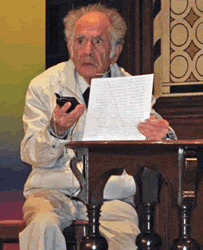Grigory Solomonovich Pomerants (also: Grigorii or Grigori, born March 13, 1918, Vilnius, Poland – now Lithuania) is a Russian philosopher and cultural theorist. He is the author of numerous philosophical works that circulated in samizdat and made an impact on the liberal intelligentsia in the 60-s and 70-s.
Early life
Grigory Pomerants was born in 1918 into a Jewish family in Vilnius. His family moved to Moscow in 1925. Pomerants graduated in Russian language and literature from the Moscow Institute of Philosophy, Literature and Art (IFLI). His thesis on Fyodor Dostoyevsky was condemned as "anti-Marxist" and as a result he was barred from admission to post-graduate studies in 1939.
During the Second World War, Pomerants volunteered to the front, where he fought as a Red Army infantryman. He was twice wounded and twice decorated.
In 1946, he was expelled from the Communist Party for "anti-Party statements". Three years later he was arrested and sentenced to five years' imprisonment for anti-Soviet agitation. After Joseph Stalin's death in 1953, he was released due to a general pardon. He did not rejoin the Party, which prohibited him from teaching at tertiary level.[1]
Dissident activities
Under the impression of the Hungarian Revolution of 1956 and the persecution of Boris Pasternak, Pomerants started considering furthering his political resistance. In 1959–1960, he led semi-secret seminars on philosophical, historical, political and economic issues. During this time he established contact with dissidents around Vladimir Osipov as well as the editors and contributors of the dissident magazine Sintaksis – Alexander Ginzburg, Natalya Gorbanevskaya and Yuri Galanskov, and the painters of the underground Lianozovo group.
In 1968, Pomerants co-signed the letter in support of the "Appeal to the World Public Opinion" by Larisa Bogoraz and Pavel Litvinov in protest of the Trial of the Four. As a result he was deprived of any opportunity to defend his thesis at the Moscow Institute of Oriental Studies.[2]
In addition to official articles on Oriental studies and comparative culturology, which focused on the spiritual traditions of India and China, Pomerants began to write essays on historical and social topics which had a broad circulation in samizdat. While his works were soon stopped from being printed in the Soviet Union, they were widely published in samizdat and reprinted in the western émigré magazines Kontinent, Sintaksis and Strana i Mir. A collection of essays under the title Unpublished Works was published in 1972 in Frankfurt.[3]
Pomerants' political and social articles as well as his public conduct attracted the attention of the KGB. On November 14th 1984, Pomerants was officially warned in connection with his publications abroad. On May 26th 1985, KGB agents searched his flat and confiscated his literary archive.[2]
Philosophical positions
Andrei Sakharov, who had met Pomerants in an underground seminar, describes his interests as follows:
"The most interesting and deepest reports were given by Grigory Pomerants – it was the first time that I met him and was greatly impressed by his erudition, breadth of views and academic approach in the best sense of these words. His main conceptions are the following: an exceptional value of culture created by joined efforts of all nations of the West and the East throughout centuries; the necessity of tolerance, compromise and breadth of mind; wretchedness and poverty of any dictatorship and totalitarianism, their historical fruitlessness; wretchedness and futility of any nationalism and chauvinism."
—Andrei Sakharov, Memoirs[2]
Pomerants was among the first Russian disciples of cultural and literary theorist Mikhail Bakhtin.[4]
For many years, Pomerants was involved in polemics with Alexander Solzhenitsyn. Pomerants strongly criticized what he saw as Solzhenitsyn's dogmatic Christian nationalism and argued against his notion of "evil", associated with Communism, as an unavoidably global, well-established phenomenon. In this debate, Pomerants positioned himself closer to the liberal, internationalist wing of the intelligentsia. He countered Solzhenitsyn's ideas by citing Eastern traditions which reject the notion of an inherently permanent, ontological evil.[5][6]
Other
Pomerants is married to Russian poet Zinaida Mirkina.
In 2009, The Bjørnson Prize of the Norwegian Academy of Literature and Freedom of Expression was awarded to Pomerants and Mirkina "for their extensive contribution to strengthening the freedom of expression in Russia."[7]
Major works
(Russian) [Openness to the Abyss]. , 1990 ?., ISBN 5-265-01527-2
(Russian) [Exit from Trance]. ?????., 1995 ?., ISBN 5-7357-0028-5
(Russian) [The Major World Religions] ?.: ?????., 1995 ?., ISBN 5-87907-016-6
(Russian) [Notes of an Ugly Duckling], , (1995) 2003, ISBN 5-8243-0430-0
Pomerants, Grigory. The spiritual movement from the West. An Essay and Two Talks, Caux: Caux Books, 2004, ISBN 2-88037-600-9
References
^ The International Who's Who 2004, Europa Publications, Routledge, London 2003, p. 1342. ISBN 978-1-85743-217-6; http://www.caux.iofc.org/en/node/32804
^ a b c "Gregory Pomerantz Solomonovich", Pomeranz.ru. Retrieved 1 September 2010.
^ Feldbrugge, Ferdinand (1975). Samizdat and Political Dissent in the Soviet Union. AW Sijthoff. p. 245. ISBN 978-90-286-0175-8.
^ Mihailovic, Alexandar (1997). Corporeal Words: Mikhail Bakhtin's Theology of Discourse. Evanston, Il: Northwestern University Press. p. 234. ISBN 978-0-8101-1459-3.
^ Boobbyer, Philip (2005). Conscience, Dissent and Reform in Soviet Russia. Routledge. pp. 125–126. ISBN 978-0-415-33186-9.
^ (Russian) , #11, 1990
^ "The Bjørnson Prize", Bjørnson Academy (2009). Retrieved 1 September 2010.
External links
Official website
"Conversations in depth: Grigori Pomerants", Herald of Europe No. 2, 2005
"Dissident for our times: Russian essayist and philosopher Grigory Pomerants found his voice in a Soviet prison camp", For A Change, April-May, 2001
"Preserving Depth. Interview with Grigory Pomerants", Russia Profile, January 8, 2008
"In God's Way", Gregory Pomerants, Herald of Europe No. 7, 2010
(Russian) – Notes of an Ugly Duckling, Pomerants' autobiographical essays hosted at the Andrei Sakharov Museum and Public Center
(Russian) «– Acceptance speech for the Bjørnson Prize, «», November 23, 2009
http://youtu.be/4z4dPO6zGWA(Russian) » – Digital
